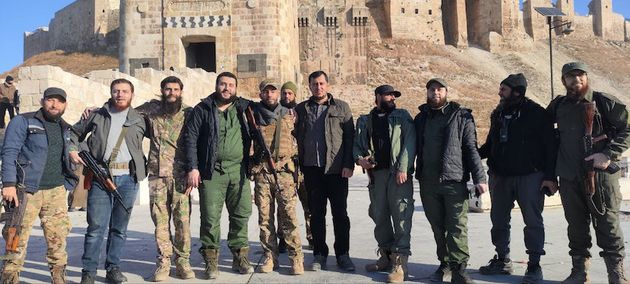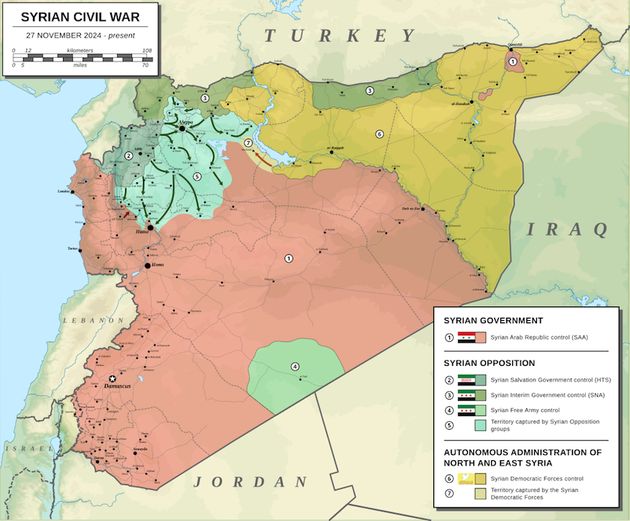“The church is still figuring out the best way to help the people living under this new reality”, says a pastor in the Syrian city. Over 700 people have been killed so far in this latest attack.
![Rebels with the Syrian opposition flag in front of the Aleppo citadel. / [link]Screenshot, RTVE[/link]](https://cms.evangelicalfocus.com/upload/imagenes/6753387971b63_alppoa.jpg) Rebels with the Syrian opposition flag in front of the Aleppo citadel. / [link]Screenshot, RTVE[/link]
Rebels with the Syrian opposition flag in front of the Aleppo citadel. / [link]Screenshot, RTVE[/link]
A new escalation of fighting in the Northwest has reignited the conflict in Syria.
It is the biggest attack against the official army and the government of Bashar al-Assad in years, after Russia and Turkey negotiated a ceasefire in 2020 that halted state attacks to retake the city of Idlib.
Now, rebel groups fighting the al-Assad regime since the civil war began in 2011 have seized a wide area of territory in the Northwest of the country, including the city of Aleppo, the second largest in Syria.
“The entrance of armed rebels forces to Aleppo happened very quickly and was a big shock for the Christians in the city, as they began to have flashbacks of what happened to them during the first years of the Syrian crisis”, explains to Spanish news website Protestante Digital, Abdallah, pastor of the Covenant church in the city of Aleppo.
Among the rebel forces opposed to the regime, the most prominent in the attack that has led to a rapid withdrawal of the government army, is the Hayat Tahrir al-Sham militia, considered a jihadist organisation by the United States, the United Kingdom, the United Nations and other countries.
Until 2016, the group was known as al-Nusra Front and was linked to al-Qaeda.

The involvement of other countries in the conflict has further complicated the scenario.
Some analysts explain this new rebel attack by the weakness of some of al-Assad's external allies, such as Russia, focused on the war in Ukraine, Iran and Hezbollah, which have suffered serious losses in their clashes with Israel in the wake of the Gaza War. Russia and Iran have supported al-Assad's government from the beginning.
Turkey has also become involved in the conflict, specifically in northern Syria, and the rebel groups it supports now de facto control two areas of Syrian territory bordering its own border.
Ankara's concern has focused on the Kurdish militias that control northeastern Syrian territory. Turkey's president, Recep Tayyip Erdogan, seems to see the Syrian war as an opportunity to expand its borders and put an end to the Kurdish issue.
While Iran says it is “firmly alongside of the Syrian government and its people”, and Russia calls the new rebel crackdown “an attack on Syrian sovereignty”, Turkish Foreign Minister Hakan Fidan points out that “it would be a mistake at this time to try to explain the events in Syria by any foreign interference” and calls on the Syrian government to “reconcile with its people and the legitimate opposition”.
Meanwhile, the US, UK, France and Germany have issued a joint statement calling for "de-escalation by all parties and the protection of civilians and infrastructure to prevent further displacement and the disruption of humanitarian access".
Since the war began in 2011, an estimated half a million people have been killed and another 12 million displaced from their homes.
Over 700 people have been killed so far in this latest attack, including Hayat Tahrir al-Sham militiamen, members of allied rebel groups and government army soldiers.
At least 110 of the victims are civilians, 87 killed by bombing by Russian and Damascus government fighters, according to the Syrian Observatory for Human Rights.

[photo_footer]The map of the division of Syrian territory according to the group controlling each area after the November 2024 attack. / Rr016, Wikimedia Commons. . [/photo_footer]
Pastor Abdallah explains that the initial reaction of the population after the entry of the rebels and jihadists into the city was “panic”, but “after few days passed, they began to interact with the new reality”. Yet, “the situation is very difficult”.
“The armed forces did not harm Christians or Muslims, and they are respecting everyone rights, promising to give everyone fair and equal treatment regardless of their faith. So far, we have not witnessed any harm from their side toward the Christians in Aleppo”, says Abdallah.
However, “the future is unknown, most people are afraid and trying to leave because if the rebels turn out to be extremists, then Christians will face a very dire future”, he adds.
With the return of rebels to the city and the intensification of Russian airstrikes, the humanitarian situation in Aleppo is worsening.
“There are currently no job opportunities, and people are receiving government salaries or pensions, and the prices of every basic commodity is getting higher, very soon all the people savings will be finished and they will have nothing to even buy bread”, points out Abdallah.
In the local church they are “considering what is the best way to provide basic nutritional and medical needs”.
“The church here found itself in a new reality and continues to do its mission, But it is still exploring the situation to figure out the best way to help the people who are living under this new reality”, underlines Abdallah.
Caught in a war that does not end and intensifies intermittently, Christians in Aleppo ask believers “to pray that the Lord will protect us from the dangers of any armed conflicts, whether is from forces outside Aleppo, like government and Russian air bombings; or from the conflicts inside between the different armed forces like the rebels and the Kurdish forces”.
“May the Lord also calm all the hearts to help end these conflicts so we may live in peace, and give us the wisdom, courage, power, and the means to help the people and reach them with the love and salvation of Jesus”, adds Abdallah.
[analysis]
[title]One more year[/title]
[photo][/photo]
[text]At Evangelical Focus, we have a sustainability challenge ahead. We invite you to join those across Europe and beyond who are committed with our mission. Together, we will ensure the continuity of Evangelical Focus and Protestante Digital (Spanish) in 2024.
Learn all about our #OneMoreYearEF campaign here (English).
[/text][/analysis]

Las opiniones vertidas por nuestros colaboradores se realizan a nivel personal, pudiendo coincidir o no con la postura de la dirección de Protestante Digital.
Si quieres comentar o